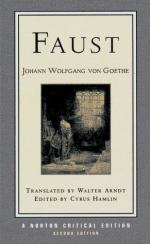[Footnote 45: “Doubt is the only rhyme for devil,” in German.]
[Footnote 46: The French translator, Stapfer, assigns as the probable reason why this scene alone, of the whole drama, should have been left in prose, “that it might not be said that Faust wanted any one of the possible forms of style.”]
[Footnote 47: Literally the raven-stone.]
[Footnote 48: The blood-seat, in allusion to the old German custom of tying a woman, who was to be beheaded, into a wooden chair.]
* * * * *
P. S. There is a passage on page 84, the speech of Faust, ending with the lines:—
Show me the fruit that, ere it’s
plucked, will rot,
And trees from which new green is daily
peeping,
which seems to have puzzled or misled so much, not only English translators, but even German critics, that the present translator has concluded, for once, to depart from his usual course, and play the commentator, by giving his idea of Goethe’s meaning, which is this: Faust admits that the devil has all the different kinds of Sodom-apples which he has just enumerated, gold that melts away in the hand, glory that vanishes like a meteor, and pleasure that perishes in the possession. But all these torments are too insipid for Faust’s morbid and mad hankering after the luxury of spiritual pain. Show me, he says, the fruit that rots before one can pluck it, and [a still stronger expression of his diseased craving for agony] trees that fade so quickly as to be every day just putting forth new green, only to tantalize one with perpetual promise and perpetual disappointment.



